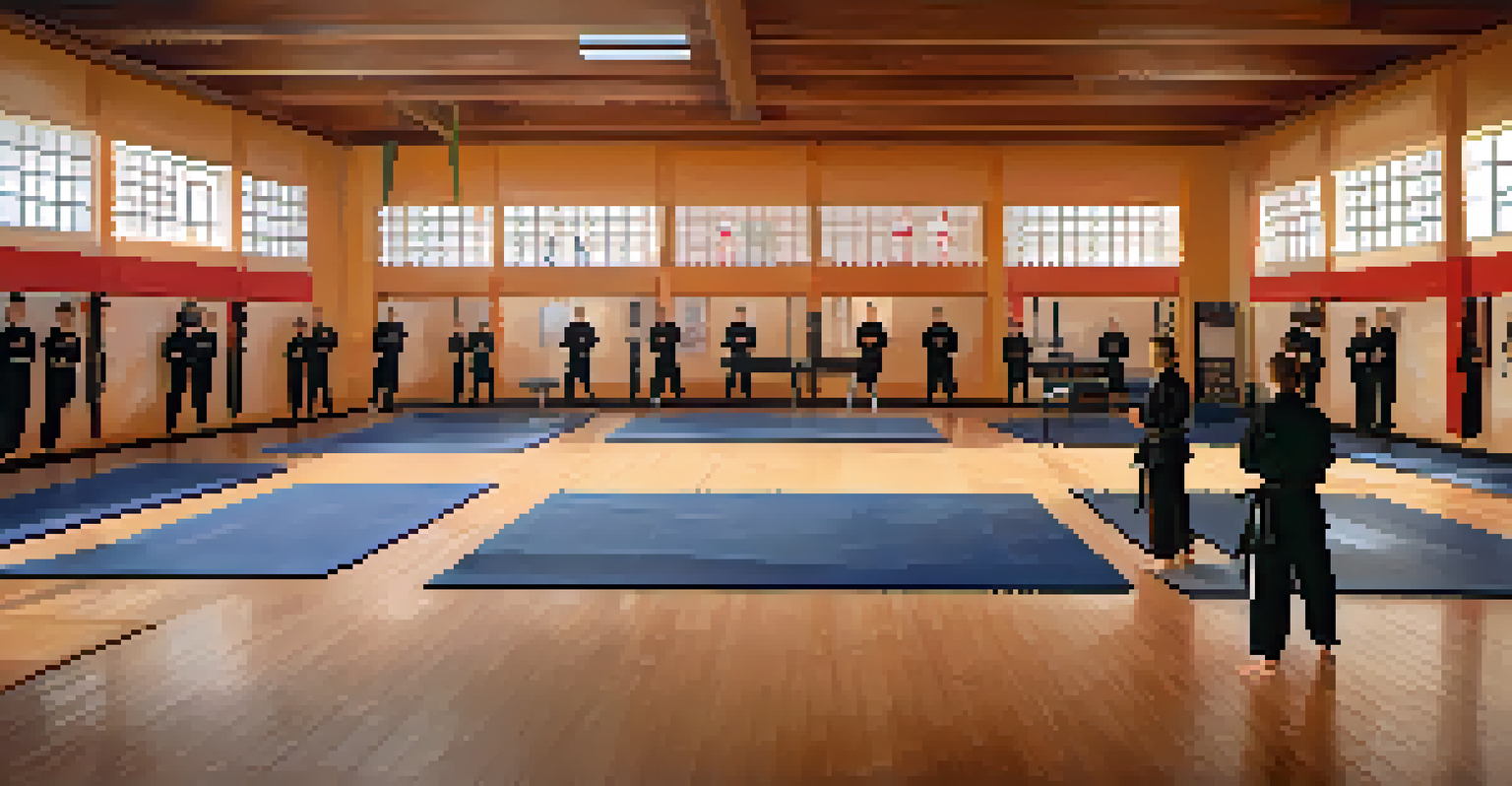Grounding Techniques for Stressful Self Defense Scenarios

Understanding Grounding Techniques and Their Importance
Grounding techniques are strategies that help bring your focus back to the present moment, especially during overwhelming situations. When faced with stress, such as in a self-defense scenario, our bodies often react with a fight-or-flight response. This reaction can cloud judgment and impair decision-making. By using grounding techniques, you can regain control and clarity, allowing you to respond effectively rather than react impulsively.
The greatest weapon against stress is our ability to choose one thought over another.
One common grounding technique is the 5-4-3-2-1 method, which encourages you to identify five things you can see, four you can touch, three you can hear, two you can smell, and one you can taste. This simple exercise helps anchor you in the present, shifting your focus away from distressing thoughts. Practicing this technique regularly can build your resilience, making it easier to access in high-stress situations.
In self-defense scenarios, staying grounded can be the difference between panic and poise. By integrating grounding techniques into your routine, you not only prepare yourself for potential threats but also enhance your overall mental well-being. This proactive approach equips you with tools to handle stress, ensuring you're ready for whatever comes your way.
Breathing Exercises to Calm the Mind
Breathing exercises are one of the simplest yet most effective grounding techniques. When we experience stress, our breathing tends to become shallow and rapid, which can exacerbate feelings of panic. By consciously slowing your breath, you can trigger a relaxation response in your body. This process not only calms your mind but also helps lower your heart rate, creating a sense of control.

One popular method is the 'Box Breathing' technique, which involves inhaling for four counts, holding your breath for four counts, exhaling for four counts, and then holding again for four counts. This rhythmic pattern can help you focus and create a sense of stability amidst chaos. Practicing this technique regularly will make it easier to access during stressful moments, such as a self-defense situation.
Grounding Techniques Enhance Focus
Utilizing grounding techniques helps individuals regain control and clarity during overwhelming situations.
Incorporating breathing exercises into your daily routine can significantly enhance your ability to manage stress. Whether you're facing an unexpected confrontation or simply feeling overwhelmed in daily life, these techniques remind you that you have the power to calm your mind, no matter the circumstances.
Visualization Techniques for Confidence and Clarity
Visualization is a powerful grounding technique that involves creating mental images to enhance your emotional state. By picturing a safe space or a calm scenario, you can help ease anxiety and improve your focus. This technique can be particularly helpful before engaging in self-defense training or if you find yourself in a tense situation, as it fosters a sense of control over your environment.
In the midst of movement and chaos, keep stillness inside of you.
To practice visualization, find a quiet space and close your eyes. Imagine yourself in a peaceful setting, engaging all your senses to create a vivid mental picture. As you immerse yourself in this visual experience, your body will begin to relax, and your mind will become clearer. This calming imagery can shift your perspective and help you approach stressful situations with confidence.
In self-defense scenarios, having a mental toolkit that includes visualization can empower you to handle challenges more effectively. By visualizing successful outcomes, you train your mind to respond positively under pressure, making it easier to transition from anxiety to action when needed. The more you practice, the more instinctive this technique will become.
Physical Grounding Techniques to Reconnect with Your Body
Physical grounding techniques involve engaging your body to help you stay connected to the present moment. These techniques can be particularly effective in high-stress situations, as they redirect your focus away from overwhelming thoughts and back to your physical sensations. Activities like tapping your feet, squeezing a stress ball, or even engaging in light stretching can help ground you.
One effective physical grounding technique is the use of 'body awareness.' Take a moment to scan your body from head to toe, paying attention to how each part feels. This practice encourages mindfulness and can help shift your focus away from stressors. By bringing awareness to your body, you create a sense of safety and can better navigate stressful situations.
Breathing Exercises Calm Anxiety
Conscious breathing practices, like Box Breathing, effectively reduce stress and promote relaxation.
Incorporating physical grounding techniques into your routine can help build resilience and prepare you for unexpected challenges. By training your body to respond positively to stress, you enhance your ability to manage anxiety in self-defense scenarios. Remember, the goal is to find what works for you, so don’t hesitate to experiment with different techniques.
Mindfulness Practices to Enhance Focus and Clarity
Mindfulness practices are essential grounding techniques that encourage you to stay present and aware of your surroundings. By practicing mindfulness, you can reduce anxiety and improve your ability to think clearly in stressful situations. Simple practices, such as mindful walking or eating, can help you develop this skill and make it easier to stay grounded when it matters most.
To cultivate mindfulness, try setting aside a few minutes each day to focus on your breath or observe your thoughts without judgment. This practice trains your brain to remain calm and centered, even during high-pressure situations. Over time, you'll find that your ability to stay focused improves, allowing you to respond more effectively in self-defense scenarios.
Incorporating mindfulness into your daily life can dramatically impact your stress levels. By dedicating time to this practice, you're not only preparing yourself for unexpected challenges but also enhancing your overall mental well-being. Remember, the more you practice mindfulness, the more natural it will become to tap into this state of calm when you need it most.
The Role of Positive Affirmations in Stress Management
Positive affirmations can serve as powerful grounding techniques that help you combat negative thoughts and boost your confidence. When faced with stress, our inner dialogue can become overwhelmingly critical, which can hinder your ability to think clearly. By consciously repeating positive statements, you can reframe your mindset and reinforce your ability to handle challenging situations.
For instance, affirmations like 'I am strong and capable' or 'I can handle whatever comes my way' can help shift your focus from fear to empowerment. You can practice affirmations during quiet moments or even during physical activities like walking or stretching. This repetition helps embed these positive beliefs in your subconscious, making it easier to access them when needed.
Personal Routines Prepare for Stress
Creating a tailored grounding routine ensures readiness to manage anxiety in self-defense scenarios.
In self-defense scenarios, having a toolkit of positive affirmations can be incredibly beneficial. By fostering a strong, confident mindset, you are better equipped to respond effectively to threats. Remember, the words you say to yourself matter, and cultivating a positive internal dialogue can significantly impact your ability to manage stress.
Creating a Personal Grounding Routine for Self Defense
Developing a personal grounding routine is essential for maximizing the effectiveness of these techniques in stressful situations. Tailoring your routine to fit your needs and preferences ensures that you have a reliable toolkit at your disposal when anxiety strikes. Start by selecting a few grounding techniques that resonate with you, such as breathing exercises, visualization, or physical grounding methods.
Next, practice these techniques regularly to build familiarity and confidence. Consider incorporating them into your daily activities, such as morning rituals or pre-workout warm-ups. The more consistent you are with your practice, the more instinctive these techniques will become when you need them the most.

Finally, remember to remain flexible and open to adjusting your routine as needed. Life can be unpredictable, and your stressors may change over time. By staying attuned to your needs and continuously refining your grounding techniques, you'll be better prepared to navigate any self-defense scenario with calm and clarity.